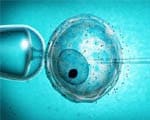While age is key in a woman's odds of conceiving, whether naturally or via assisted reproduction, there is no consistent evidence that a man's age affects the chances of successful infertility treatment.

Both in-vitro fertilisation (IVF) and intracytoplasmic sperm injection (ICSI) involve joining a woman's egg and a man's sperm in a lab dish, then - if fertilization is successful - transferring one or more embryos to the woman's uterus. ICSI is typically used for male fertility problems, including a low sperm count or poor sperm quality. It involves isolating a single sperm and injecting it directly into the egg.
It's known that women's fertility declines after age 35, and drops sharply after about age 40. And the odds of having a baby through assisted reproduction show a similar decrease.
Men are capable of fathering a child even into their golden years. However, studies have indicated that they do have a biological clock of sorts. Sperm quality, research suggests, may decline after age 40, and so too may the chances of having a baby. A previous study has found that when the man was older than 40, a couple's risk of miscarriage was higher compared with couples in which the man was younger. However, only a handful of studies have looked at the relationship between men's age and fertility-treatment outcomes.
Researchers pulled together 10 international studies that have looked at the question. Each involved anywhere from about 200 to 2,000 couples who underwent fertility treatment. Overall, it was found, most of the studies failed to find an association between men's age and sperm quality, the odds of couples' conceiving or the chances of ultimately having a baby. However, one study of 221 couples did find a connection: among couples in which the man was age 35 or younger, the pregnancy rate in their partners was 53 percent, versus 35 percent among partners of men aged 36 to 40. The pregnancy rate dipped as low as 13 percent among partners of men older than 40 . There was a similar pattern when it came to birth rates in their partners. Among men age 35 or younger, the rate was 38 percent, compared with 17 percent among those ages 36 to 40, and 7 percent for men older than 40.
However, this lone study is not enough to prove that older fathers affect the outcome of fertility treatment. However, this was the only study that was 'prospective'- meaning it followed treatment-seeking couples over time, rather than reviewing their records after they had undergone fertility treatment. In general, prospective studies yield stronger evidence. So while there is currently 'insufficient evidence' that a man's age affects fertility-treatment success, more studies are needed. Understanding how men's age affects fertility in general is becoming increasingly important, as more couples postpone pregnancy and second marriages are becoming more common.
DoctorNDTV is the one stop site for all your health needs providing the most credible health information, health news and tips with expert advice on healthy living, diet plans, informative videos etc. You can get the most relevant and accurate info you need about health problems like diabetes, cancer, pregnancy, HIV and AIDS, weight loss and many other lifestyle diseases. We have a panel of over 350 experts who help us develop content by giving their valuable inputs and bringing to us the latest in the world of healthcare.












